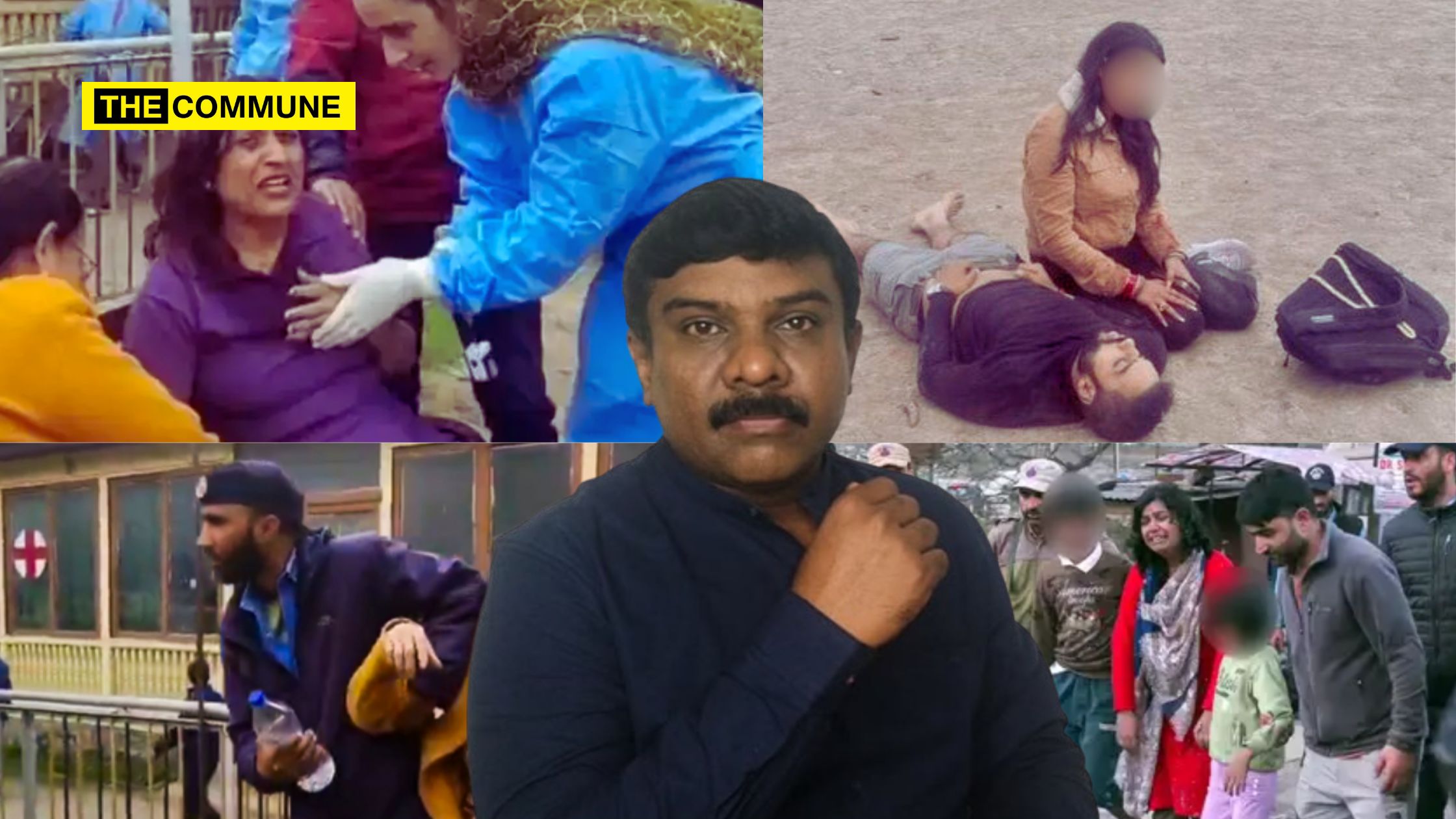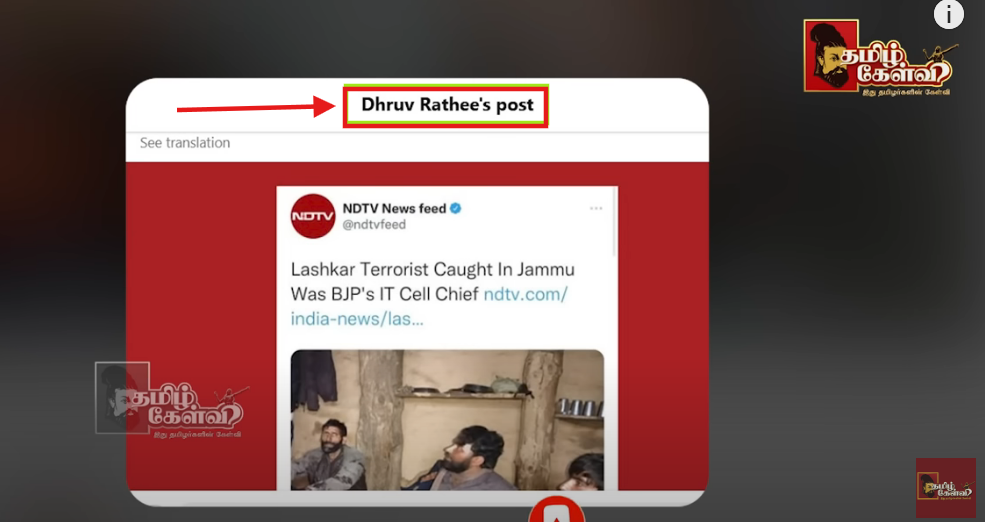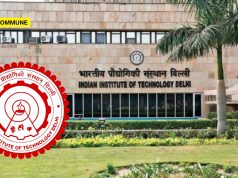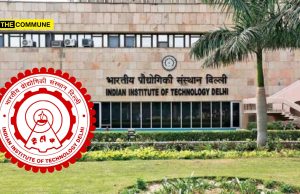
As expected, several Dravidianist propagandists and DMK-supporting YouTubers have quickly mobilized to shift the narrative surrounding the recent terror attack in Pahalgam, Anantnag district, Jammu & Kashmir—where Hindus were specifically targeted. Instead of acknowledging the religiously motivated nature of the attack, these content creators have focused their criticism on the BJP-led central government, blaming Union Home Minister Amit Shah and Prime Minister Narendra Modi for the security lapse.
What’s even more disturbing is the way these YouTubers rushed to downplay the clear anti-Hindu motives behind the attack. Despite reports that the terrorists declared a ‘jihad,’ demanded victims recite the kalma, and stripped tourists to identify their religion—deliberately targeting Hindus—these Dravidianist influencers have shown a shocking reluctance to acknowledge the facts. Their apparent goal? To preserve the minority Muslim vote bank and stay in favor with their political patron, the DMK.
One notable example is Senthil Vel, who runs the Tamil Kelvi YouTube channel and former anchor for the Tamil news outlet Maalai Murasu. He controversially questioned why those calling the Pahalgam terrorists “Muslims” don’t also label espionage suspects arrested in India as “Hindus.” Another channel, Arakalagam, echoed this exact sentiment, further fueling confusion and deflection.
Many viewers were left baffled by the false equivalence between terrorist acts and espionage cases, but these influencers appeared more interested in reinforcing the DMK’s narrative than addressing the seriousness of the attack. Senthil Vel even went a step further by emphasizing that those arrested in espionage cases were not only Hindus but also Brahmins—exposing the deeply rooted caste-based animosity often associated with hardline Dravidianist rhetoric.
These reactions have sparked outrage and concern among the public, who see them as a blatant attempt to politicize a tragedy and shield religiously motivated violence from scrutiny.
As the video opens, Senthil Vel, a self-styled Dravidianist journalist, dives into a dramatic monologue, promising to deliver a “hard-hitting exposé” on alleged links between terrorists and BJP members. With a fiery tone, he declares, “Before we dive into this video. Today, I’m going to reveal the supposed connections between terrorists and BJP executives—with proof. So, these so-called ‘fake patriots’ run away. 25 citizens have been sacrificed due to terrorism. We’ve all spoken out in anger against terrorism, and I too condemn the Pahalgam terror attack. But let me be clear—the Prime Minister, Home Minister, and Defence Minister are directly responsible. They must resign. I’m accusing them that they are weak and going to criticize them even more. I’m not here to bluff anything. I’m going to show the links between terrorists and BJP members, explain in detail who were all arrested. Enough of sacrificing innocent lives for dirty politics. And now, certain groups are shamelessly pushing anti-Muslim hashtags online. What injustice!”
Despite this intense introduction, the video quickly derails. Like many Congress and Dravidianist social media figures, Senthil Vel attempts to argue that “terrorism has no religion.” But his core argument is built on flawed comparisons—equating espionage cases involving Hindu individuals with religiously motivated terror attacks carried out by Islamist groups, particularly from Pakistan. The logic doesn’t hold up, and rather than proving a point, it reveals a poor understanding of the fundamental differences between espionage and terrorism.
Worse still, he makes a blatantly casteist remark, implying that many involved in such activities are Brahmins, “Most of them are the ones who say, ‘We are born with brains, we are intelligent.’ They are half of it. I don’t want to say more.” This thinly veiled jab reflects a deep-rooted bias that frequently surfaces in Dravidianist discourse.
Senthil Vel attempts to further his argument by presenting a list of alleged “Hindu terrorists,” the first case he cites involves a July 2024 news report, initially promoted by Congress & AAP sympathizer Dhruv Rathee who was widely known for his partisan, left-leaning propaganda.

According to the report from NDTV, Talib Hussain Shah, a wanted Lashkar-e-Taiba terrorist captured in Jammu and Kashmir, was affiliated with the BJP’s Minority Morcha and handled their social media in Jammu. However, the timeline and context were misrepresented. The incident wasn’t recent, and more importantly, the accused was a Muslim, contradicting Senthil Vel’s attempt to show Hindus in the same light. This visibly confused him mid-video, and rather than correcting the inconsistency, he scrambled to deflect blame back onto the BJP—accusing the party of giving space to terrorists. The irony was glaring.
Senthil Vel then cited another post—this time from Alt News co-founder Mohammed Zubair, a propagandist frequently accused of spreading misleading or partisan narratives favoring Congress and its allies like the DMK, TMC, and others. Referring to content published by Alt News, Senthil Vel claimed that a BJP IT Cell member, Dhruv Saxena, along with 10 others, had been arrested for allegedly assisting Pakistan’s ISI in spying on the Indian Army.
He presented this as a major embarrassment for the BJP. However, what was more questionable than the allegation itself was the near-total silence from mainstream media outlets on the matter—only Alt News had reported it prominently, raising concerns about the credibility and selective amplification of such stories. This, in fact, was a point of contention that had already been heavily pushed by Congress and its ecosystem. Despite his attempt to frame it as a significant expose, the reliance on a single, politically biased source and the lack of broader media coverage casts serious doubt on the narrative being promoted.
Continuing his attempt to tie terrorism to the BJP, Dravidianist YouTuber Senthil Vel brought up the much-discussed case of journalist Ved Pratap Vaidik’s controversial meeting with terrorist mastermind Hafiz Saeed. The meeting, which triggered uproar in Parliament at the time, was politicized further by Congress leader Rahul Gandhi, who remarked, “The man is from the RSS. That’s a known fact. We want to know if the Indian embassy facilitated this meeting.”
However, the facts were different. Ved Pratap Vaidik met Saeed as a journalist, risking his safety for an interview. Much like Tamil journalist Nakkeeran Gopal—who once interviewed the dreaded bandit Veerappan and has long been a known DMK supporter—Vaidik’s meeting was more journalistic than ideological. Yet, unlike Vaidik, Gopal was never accused or vilified; in fact, he was even utilized by the Tamil Nadu government. Journalists, at times, pursue uncomfortable truths. But Senthil Vel seemed more interested in pushing a narrative rather than evaluating the facts.
He also listed a series of espionage-related arrests, wrongly labeling them as evidence of “Hindu terrorism,” failing to distinguish between acts of spying and religiously motivated terror. Here are some of the cases he cited:
-
Pradeep Kurulkar (DRDO scientist): Arrested for allegedly leaking sensitive information to Pakistan. Congress claimed he had longstanding ties with the RSS and came from a family associated with the Sangh for generations. [Reported by Economic Times]
-
Mahesh Kumar (MES employee): Allegedly honey-trapped by a Pakistani military agent via Facebook and arrested in Haryana. [India Today]
-
Deepak Shirsath (HAL employee): Accused of sharing confidential fighter jet details with Pakistan’s ISI via WhatsApp and social media. [NDTV]
-
Rajeev Sharma (Journalist): Arrested for passing information to Chinese agents. A Chinese woman and a Nepalese man were also detained in connection with the case. [The Hindu]
-
Madhuri Gupta (Ex-Diplomat): Convicted and sentenced to three years in jail for spying for Pakistan during her tenure at the Indian High Commission in Islamabad. [The Hindu]
-
Indian Navy Honeytrap Case: Thirteen naval personnel apprehended for espionage involving suspected social media contacts with Pakistani operatives. [India Today]
-
ISI Agent Trail – Gujarat/UP: An ISI-linked agent, Rajaka Khumbhar, was arrested by NIA in Gujarat. A money trail of Rs 5,000 led to a contact in Uttar Pradesh. The case involved sensitive information leaks traced back to a man named Mohammad Rashid. [TOI]
-
BSF Jawan in Smuggling Racket: Sumit Kumar, a BSF constable, was arrested as the alleged kingpin in a Pakistan-linked arms and heroin smuggling ring. Weapons bearing Pakistan Ordinance Factory markings and Rs 32.3 lakh in drug money were seized. [TOI]
While espionage is undoubtedly a national security threat, Senthil Vel’s attempt to equate these cases with terrorism driven by religious ideology is a false equivalence. Terrorism—especially incidents like the Pahalgam attack targeting Hindus—is fundamentally different from cases of spying or smuggling.
What was meant to be a bold exposé quickly unraveled into a confused, misinformed rant riddled with contradictions, caste-based jabs, and selective outrage. Senthil Vel’s attempt to push a politically convenient narrative only exposed the fragility of the argument and the desperation to defend an increasingly indefensible position.
Subscribe to our channels on Telegram, WhatsApp, and Instagram and get the best stories of the day delivered to you personally.




